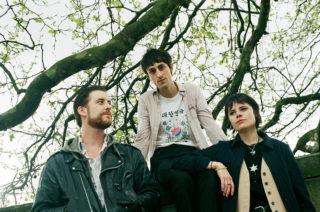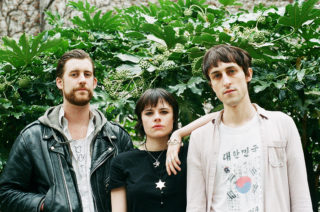A turn around the Hockney exhibition with Leeds’ most alluring minimal punk band – Drahla
A band not quite fitting in

A band not quite fitting in
Even though it’s Saturday lunchtime, Tate Britain isn’t all that busy for a change. That said, I’m slightly concerned that I’m going to struggle to pick out the members of Drahla from the groups of similarly dressed art students clustered around the steps leading to the main entrance. I needn’t have worried. Turns out the Leeds-based three-piece are instinctively easy to spot. Bounding up the stairs in their leather jackets, vintage t-shirts and angular haircuts, they are three people who look like they should be in a band.
Having played Camden’s Lock Tavern the night before, they’ve decided to make a weekend out of their first visit to London, to check out the Tate’s acclaimed David Hockney exhibition. “For me and Lu, he’s been a massive inspiration, artistically,” says guitarist Rob Riggs. “He’s always trying to look at art in all these different ways and is always trying to find new ways of creating. For him to have this massive retrospective, I just knew that I had to come down and see it.”
“I find him incredible,” adds bandmate Luciel Brown as we walk through the heavy-set front doors and into the Tate’s gleaming neo-classical rotunda. “It’s amazing that he’s still coming up with these amazing new ideas. If you look at the work over his career, it’s pretty astounding – I like pretty much everything he’s done ever and the work varies quite a bit as well. I’m really excited to be able see it all in one space.”
In some ways Hockney’s work and Drahla’s music are strikingly similar. They both produce work that is deeply personal in nature and both are fiercely committed to doing things in their own way. Like Hockney, Drahla’s output also has a strange, existential darkness lurking just below the surface. With a sound that recalls Sonic Youth, The Breeders and cult Glaswegian post punks Life Without Buildings (without really sounding like any of them), they’ve perfected a broiling, bass-driven version of minimal punk that is both alluringly hook-laden yet simultaneously dangerous. As a recent review on Norman Records observed, the three-piece stand aside from most of today’s indie acts by “having their own sound and not simply coming up with a facsimile of something that has already occurred.”
New single ‘Fictional Decision’ is a case in point. Rejecting the contemporary fashion for layered, fuzz-pedal driven psychedelia, it’s an exercise in pure, stripped down menace. The trio’s first solo single after a spate of split EPs and live videos, its sparse, machine-like drums, wiry guitar squeals and spluttering talk-sung vocals take aim at dogmatic thinking and the authority figures who advocate it.

Finding the clatter of plates and teacups in the Tate café a bit too much we decide to relocate to the Royal Oak, a short walk through the red-brick estates that back onto the rear of Tate Britain. Claiming a table on the opposite side of the pub to the group of burly Chelsea fans shouting at the horse racing we get into a conversation about the single’s bluntly religious themes. “It’s about questioning the things that are presented to you,” explains Brown thoughtfully. “A lot of people just seem to accept what they’re told without batting an eyelid. They read something and take it as gospel, but is everything real that has been fed to you?”
The conflict between blind faith and skepticism is a reoccurring theme in Brown’s lyrics and stem from a childhood spent at a traditional, catholic school. “I ended up questioning a lot of the things I was subjected to,” she tells me in what I realise is her typically straight forward manner. “You have these figures who are in a certain position and who you respect, but I found myself asking why? Who are they? What’s real? Why do they believe the way they do? It’s something that comes up a lot in my life, and I think it comes mainly from my time at school – it’s always kind of there.”
“It’s also a song that almost didn’t happen,” adds the band’s drummer, Mike Ainsley. “The idea was to create this song along to this beat to the keyboard, but because we were in this shitty practice room we couldn’t really hear it properly. In the end, we decided to try and replicate the drums live, and it all kind of built from there.”
‘Fictional Decision’ has been something of an evolution for Drahla, both in terms of their music and their way of working. Having released a couple of home recordings on various splits, the band decided to mix things up and enter the studio with Hookworms’ front man and Leeds producer MJ. Yet despite having one of the city’s most forward-thinking talents in their corner, Drahla seem slightly out of step with the music scene in Leeds; at least for the moment. In a city that’s more synonymous with experimental psych rock and tough guy metalcore, their melodic blend of art rock and post punk leaves them sticking out a bit. “It took us a while to really get into the scene, as it were,” muses Riggs as we talk about the group’s experience of the city. “I still feel a bit like outsiders to everything that is going on in Leeds. In fact, I kind of like being ignorant to all of it. I don’t really know what’s going on with bands in the city; I just concentrate on what we’re doing.”
“Saying that, we’ve been billed with a lot more similar bands recently,” counters Brown. “There’s a band called Mush that we’ve played with a few times and we fit really well. It’s been really good to play with a band like them and realise that there really is a bit of a scene in Leeds that we sort of fit into.”
Even if they are a bit out of place for now there’s no denying that Drahla are benefitting from the renaissance that is currently sweeping through the North of England’s music scenes. As life in the capital becomes ever more unforgiving, I get the impression that many musicians are choosing to start bands in the provinces these days. Both Riggs and Brown spent a few years in London before moving back to West Yorkshire to start Drahla, and I’m interested to find out if their relocation has helped. “It’s made a massive difference,” says Brown, leaving me with no illusions. “There’s no time limit on everything. We have the time to experiment and develop our sound without thinking ‘how much is this costing us?’ I think we’ve managed to achieve more by being back in Leeds. You just have a bit more freedom than you do in London.”
It’s a sentiment that Riggs agrees with wholeheartedly. “It’s so much cheaper! Even though living in London gave me a bit of a musical education and turned me onto a lot of late seventies punk bands, in Wakefield you can afford not to work as much and still have a decent standard of living. If you live down here it seems that if you want a decent house you need to be slogging it out at work all hours you’re given.”
A better sense of work/life balance is clearly one of the main reasons why many bands are choosing to ditch London for the provinces. When they’re not recording or on tour, the members of Drahla work in call centres, libraries and, in Brown’s case, visual merchandising. All are jobs that allow them the time and freedom to pursue their music without the threat of eviction or having to survive on 20p cans of beans for months on end. “I’d love to live in London but I feel like you need to be established before coming. It seems so full on,” explains Riggs, the member who is currently working in a call centre. “It’s a job that doesn’t take any brainpower whatsoever, so I can kind of sit around and daydream about stuff. Certain things will pop up and I’ll compile it and use it later when we’re writing songs.”
As we wrap up our interview, we end up half joking about Leeds and Wakefield becoming the next creative hub – a new version of ’70s New York or late ’80s Manchester. “I don’t know about that, it’s pretty grim and craggy round there,” smiles a skeptical Brown. “Yeah, I mean, aside from Saltaire, it’s kind of grim,” agrees Ainsley, “but maybe creativity always comes out of grimness?”